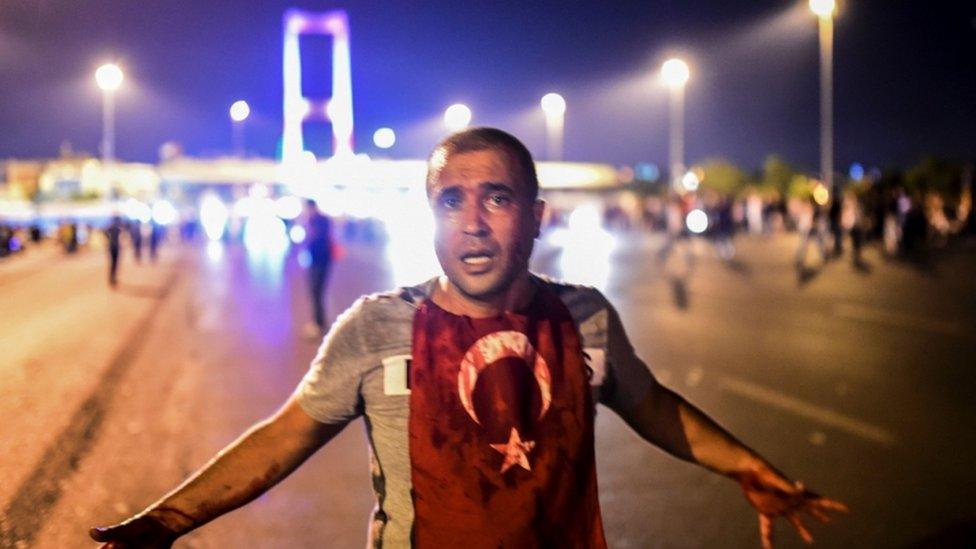Turkey failed coup: How do Turks in Europe see Erdogan?
- Published
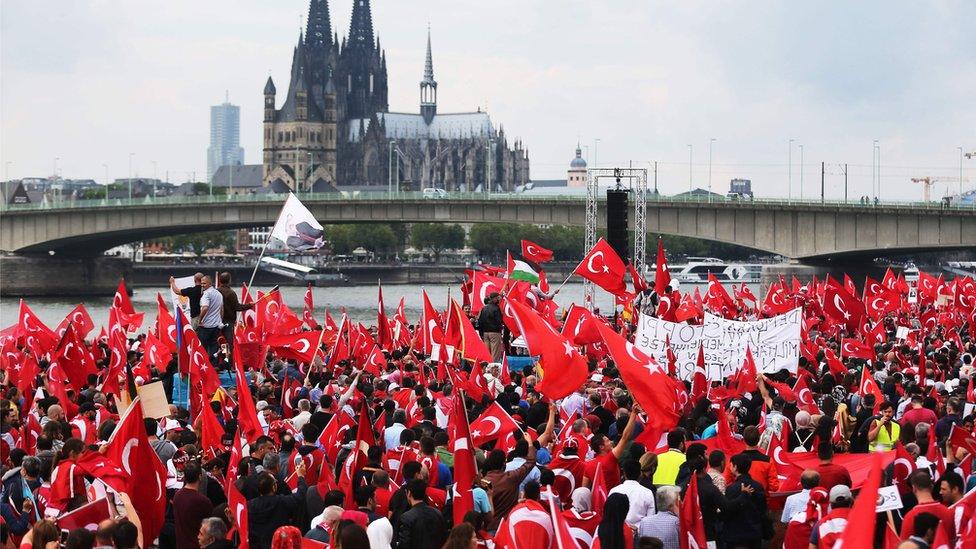
About 40,000 pro-Erdogan supporters turned up in Cologne on Sunday
Tension between supporters and opponents of President Recep Tayyip Erdogan following the failed coup on 15 July has been growing in Turkish communities all over Europe. We take a look at how President Erdogan is regarded by some of the larger Turkish diasporas, and at how the political conflict in Turkey is being played out across Europe.
Germany
Sunday's protest in Cologne, in the state of North Rhine-Westphalia, where about a third of German Turks live, had been organised as an "anti-coup" protest.
But many of the demonstrators supported President Erdogan and the crackdown he has ordered since.
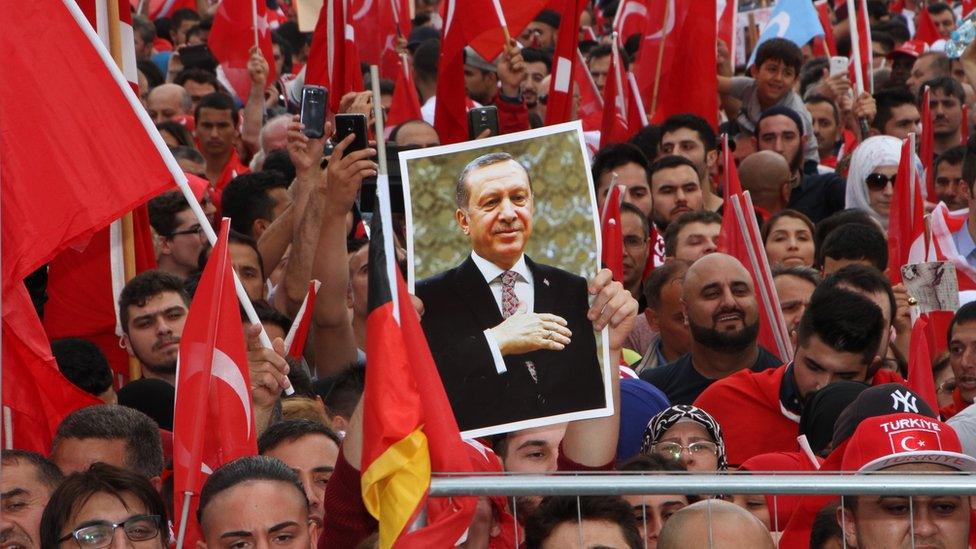
The "anti-coup" demonstration in Cologne showed overwhelming support for President Erdogan
With an estimated three million people of Turkish origin, Germany is home to the largest Turkish diaspora.
Of those with Turkish nationality, 60% voted for President Erdogan's Justice and Development Party (AKP) in last November's election, a bigger share than he received in Turkey itself.
Whereas German politicians and the German media are increasingly critical of Mr Erdogan's crackdown, Germany's Turkish community has largely applauded him for defending democracy.
They identify with Mr Erdogan, who was brought up in an ordinary family from the provinces. They also see him as the driving motor behind Turkey's economic boom.
"The people want to move forward and they see Erdogan as a strong figure. If not, the people fear a civil war similar to the situation in Iraq or Syria," Talat Kamran, of the Mannheim Institute for Integration and Inter-religious Dialogue told Deutsche Welle., external
But not all German Turks are Erdogan supporters.
There are reports of increasing tension between his supporters and followers of the US-based cleric Fethullah Gulen.
The leader of the German Greens, Cem Ozdemir, complained to German media that critics of Mr Erdogan in Germany's Turkish community were being targeted.
"An atmosphere of fear must not be created," he told the Frankfurter Allgemeine newspaper., external

The Netherlands
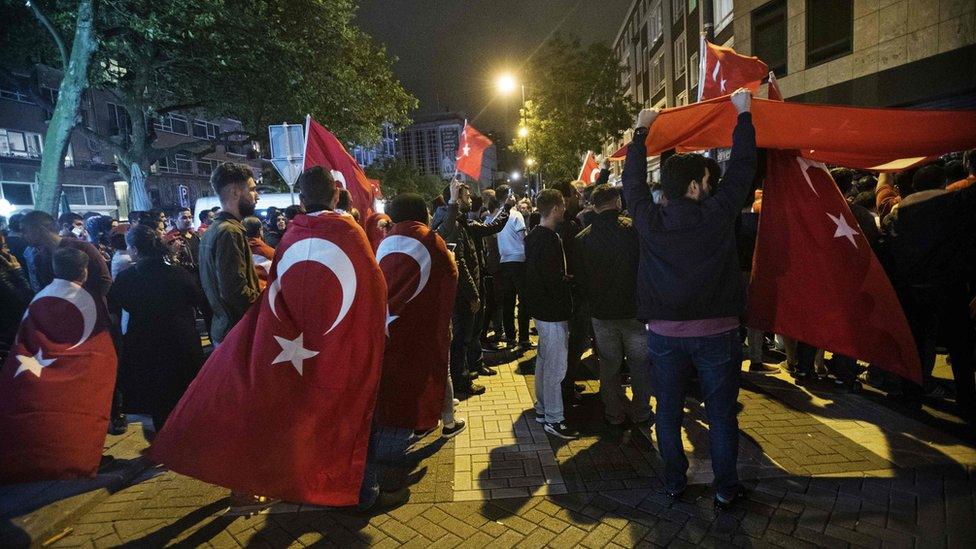
Turks took to the streets in Rotterdam in the immediate aftermath of the failed coup
Of the estimated 400,000 ethnic Turks in the Netherlands, the majority are AKP supporters, with 67% of those with Turkish nationalities voting the AKP in November.
On Sunday, many of them piled into buses to voice their support at the demonstration in Cologne.
The organisers of the trip said they demonstrated for democracy, but many of the protesters held placards with images of President Erdogan.
Supporters of Fethullah Gulen are relatively low in number in the Netherlands, but better education allows them to have good relations with Dutch institutions.
There have been reports of attacks against a number of Gulenist cultural centres in Rotterdam, which has a large Turkish community.
Rotterdam's mayor, Ahmed Aboutaleb, appealed for calm in the wake of the coup.
"Don't import the conflict: it's bad enough that these tensions exist in Turkey," he said.

Austria
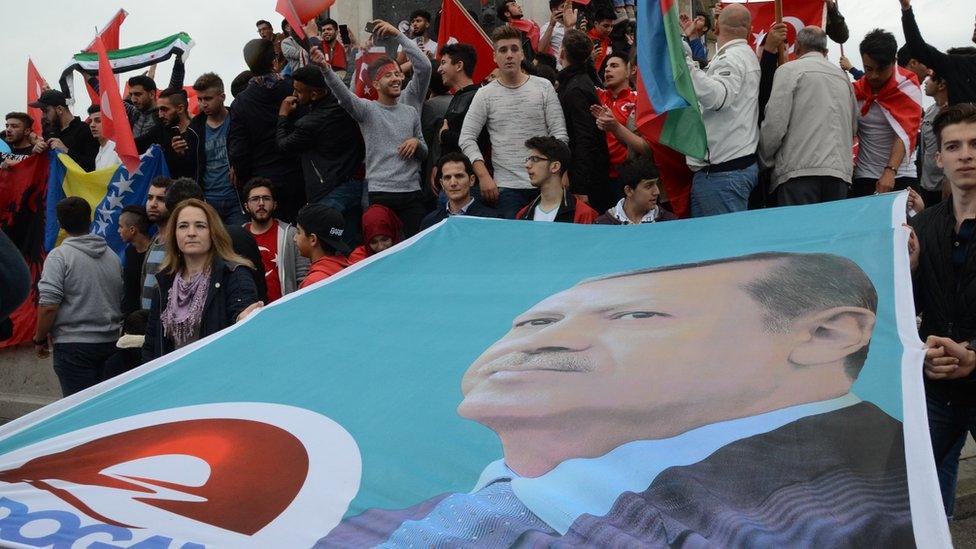
The day after the failed coup, Turkish demonstrators in Vienna protested against what they called the "Gulenist" plot
Like in Germany and the Netherlands, the majority of Austria's 160,000 ethnic Turks are Erdogan supporters.
In the immediate aftermath of the coup, there were protests in Vienna, attended by more than 1,200 people.
There has been intimidation too.
Over the past few days, Austrian Chancellor Christian Kern has been receiving death threats from Erdogan supporters, apparently posted in Turkey.
The Austrian media commented on the Turkish conflict spilling over.
Following the protests in Vienna, the Turkish ambassador was summoned.
Foreign Minister Sebastian Kurz acknowledged the right of protesters to demonstrate.
But Mr Kurz told ORF: "Whoever wants to be engaged in Turkish domestic policy is free to leave our country."
He appealed to ethnic Turks to be loyal towards Austria. "If you bring in conflicts, you will influence society negatively."

France
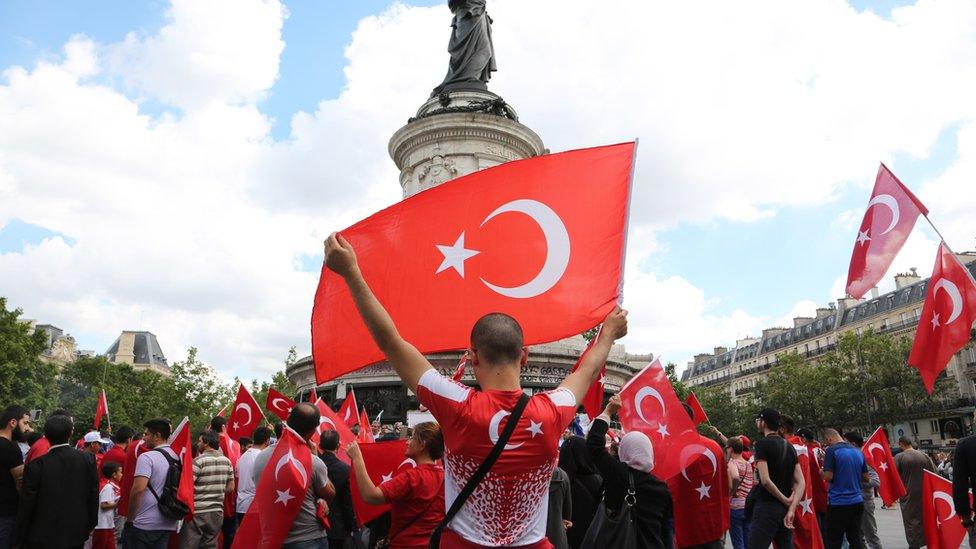
Turks in France gathered on Place de la Republique the day after the coup
France hosts the second largest Turkish diaspora in the world, with more than 400,000 people of Turkish origin.
There have been two demonstrations in support of President Erdogan, but there have also been reports of attacks on Gulenist institutions.
Le Monde says the conflict between Gulenists and AKP supporters in Paris is becoming more acute, external.
Insulting e-mails and incitement to hatred on social media have been reported, and Gulenist institutions received police protection in the days following the coup.
Le Monde says Turks on both sides of the divide are worried about returning to Turkey, fearing instability.

UK
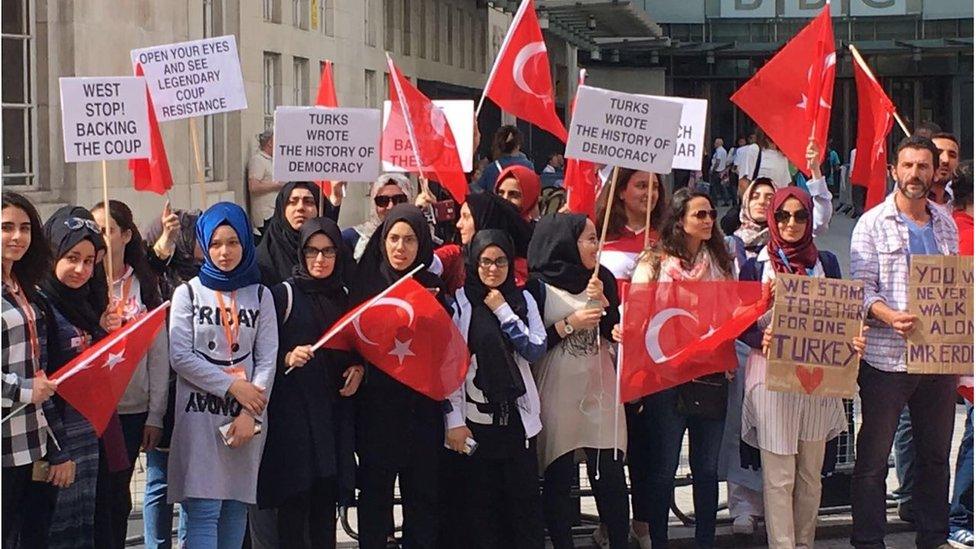
Turkish students living in London have been protesting outside BBC headquarters against the West's perceived reluctance to support President Erdogan
Britain has a relatively small Turkish community of only 50,000 people.
On the day of the coup, the Union of European Turkish Democrats (UETD) organised a small demonstration outside BBC headquarters, and the following day in front of Downing Street, shouting slogans in support of President Erdogan and against Western media coverage of the coup.
UK-based Gulenists say they have been the target of abuse by pro-Erdogan supporters.
Within a few hours of President Erdogan urging people to take to the streets in protest on the day of the coup, the Mevlana Rumi mosque in Edmonton, north London, said it was targeted.
"Two people entered the mosque. They started shouting out, swearing, breaking the peace," said Seval Gokce, the mosque's executive director.
Here too, the political conflict in Turkey appears to be spilling over.
- Published31 July 2016
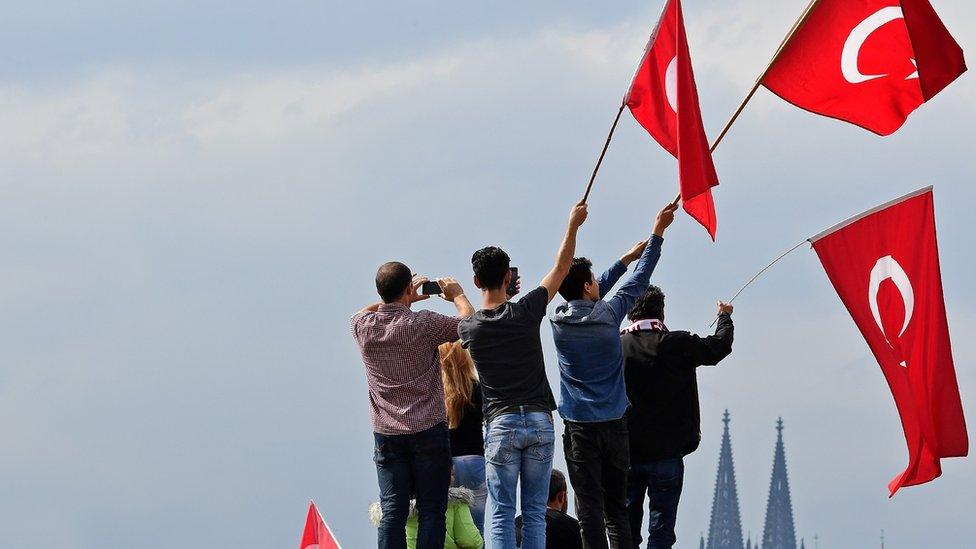
- Published1 August 2016
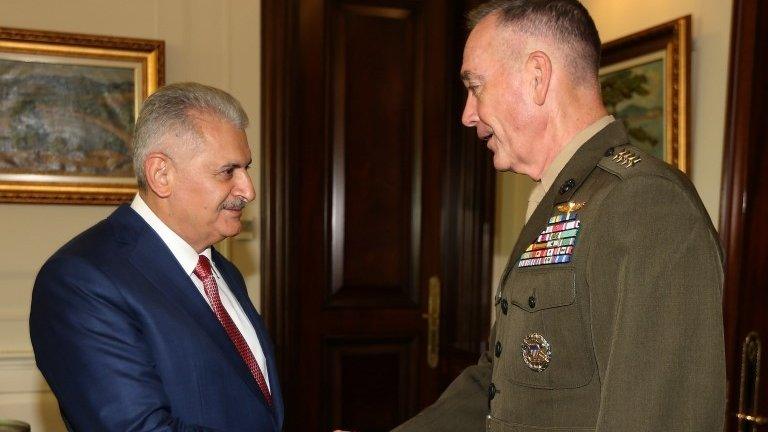
- Published6 June 2016
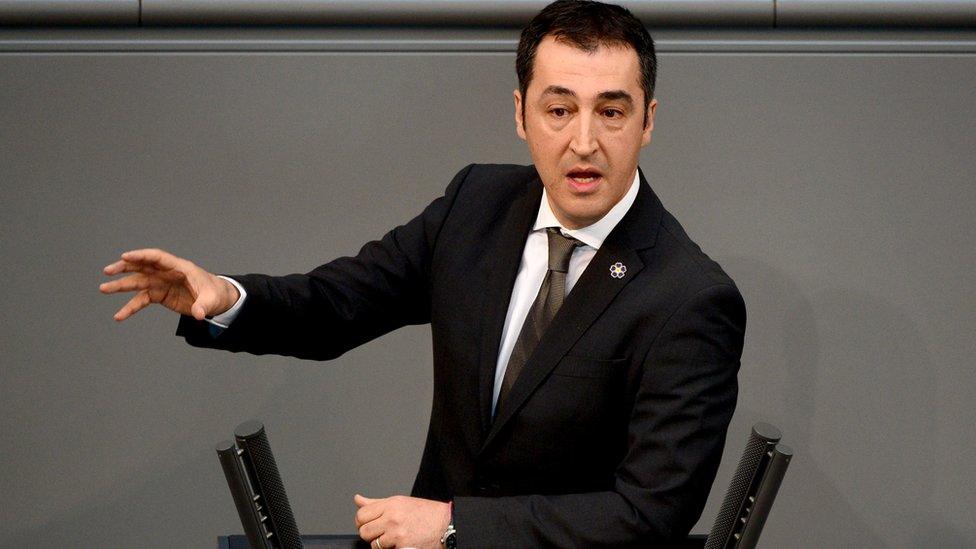
- Published29 July 2016
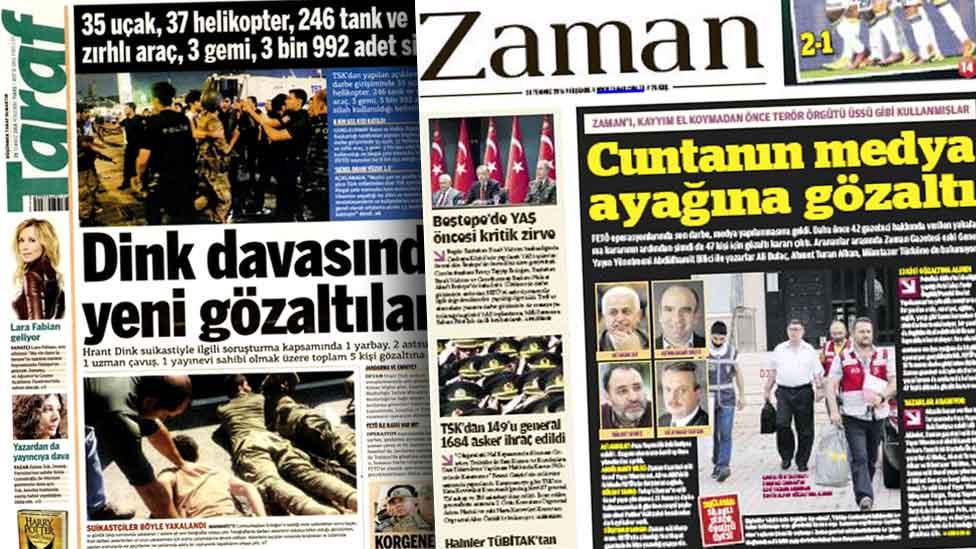
- Published17 July 2016
